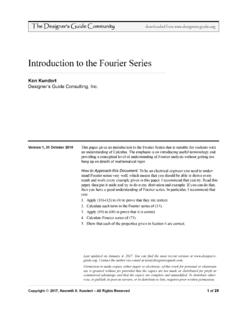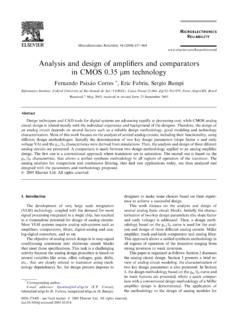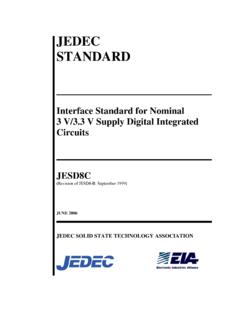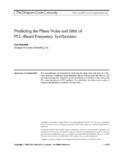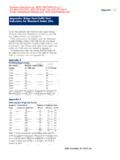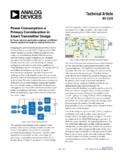Transcription of JEDEC STANDARD - Designer's Guide
1 JEDEC STANDARD Stress-Test-Driven Qualification of Integrated Circuits JESD47G (Revision of JESD47F, December 2007) MARCH 2009 JEDEC SOLID STATE TECHNOLOGY ASSOCIATION NOTICE JEDEC standards and publications contain material that has been prepared, reviewed, and approved through the JEDEC Board of Directors level and subsequently reviewed and approved by the JEDEC legal counsel. JEDEC standards and publications are designed to serve the public interest through eliminating misunderstandings between manufacturers and purchasers, facilitating interchangeability and improvement of products, and assisting the purchaser in selecting and obtaining with minimum delay the proper product for use by those other than JEDEC members, whether the STANDARD is to be used either domestically or internationally.
2 JEDEC standards and publications are adopted without regard to whether or not their adoption may involve patents or articles, materials, or processes. By such action JEDEC does not assume any liability to any patent owner, nor does it assume any obligation whatever to parties adopting the JEDEC standards or publications. The information included in JEDEC standards and publications represents a sound approach to product specification and application, principally from the solid state device manufacturer viewpoint. Within the JEDEC organization there are procedures whereby a JEDEC STANDARD or publication may be further processed and ultimately become an ANSI STANDARD .
3 No claims to be in conformance with this STANDARD may be made unless all requirements stated in the STANDARD are met. Inquiries, comments, and suggestions relative to the content of this JEDEC STANDARD or publication should be addressed to JEDEC at the address below, or call (703) 907-7559 or Published by JEDEC Solid State Technology Association 2009 3103 North 10th Street, Suite 240 South Arlington, VA 22201 This document may be downloaded free of charge; however JEDEC retains the copyright on this material. By downloading this file the individual agrees not to charge for or resell the resulting material.
4 PRICE: Please refer to the current Catalog of JEDEC Engineering Standards and Publications online at Printed in the All rights reserved PLEASE! DON T VIOLATE THE LAW! This document is copyrighted by JEDEC and may not be reproduced without permission. Organizations may obtain permission to reproduce a limited number of copies through entering into a license agreement. For information, contact: JEDEC Solid State Technology Association 3103 North 10th Street, Suite 240 South Arlington, VA 22201 or call (703) 907-7559 JEDEC STANDARD No.
5 47G Page 1 STRESS DRIVEN QUALIFICATION OF INTEGRATED CIRCUITS (From JEDEC Board Ballot, JCB-07-81, JCB-07-91, and JCB-09-15, formulated under the cognizance of the Subcommittee on Silicon Devices Reliability Qualification and Monitoring.) 1 Scope This STANDARD describes a baseline set of acceptance tests for use in qualifying electronic components as new products, a product family, or as products in a process which is being changed. These tests are capable of stimulating and precipitating semiconductor device and packaging failures.
6 The objective is to precipitate failures in an accelerated manner compared to use conditions. Failure Rate projections usually require larger sample sizes than are called out in qualification testing. For guidance on projecting failure rates, refer to JESD85 Methods for Calculating Failure Rates in Units of FITs. This qualification STANDARD is not aimed at extreme use conditions such as military applications, automotive under-the-hood applications, or uncontrolled avionics environments, nor does it address 2nd level reliability considerations, which are addressed in JEP150.
7 This set of tests should not be used indiscriminately. Each qualification project should be examined for: a) Any potential new and unique failure mechanisms. b) Any situations where these tests/conditions may induce invalid or overstress failures. If it is known or suspected that failures either are due to new mechanisms or are uniquely induced by the severity of the test conditions, then the application of the test condition as stated is not recommended. Alternatively, new mechanisms or uniquely problematic stress levels should be addressed by building an understanding of the mechanism and its behavior with respect to accelerated stress conditions (Ref.
8 JESD91, Method for Developing Acceleration Models for Electronic Component Failure Mechanisms and JESD94, Application Specific Qualification using Knowledge Based Test Methodology ). Where use conditions are established, qualification testing tailored to meet those specific requirements optimizes resources and is the preferred approach to this default STANDARD (Ref. JESD94). Consideration of assembly-level effects may also be necessary. For guidance on this, refer to JEP150, Stress-Test-Driven Qualification of and Failure Mechanisms Associated with Assembled Solid State Surface-Mount Components.
9 This document does not relieve the supplier of the responsibility to assure that a product meets the complete set of its requirements. JEDEC STANDARD No. 47G Page 2 2 Reference documents The revision of the referenced documents shall be that which is in effect on the date of the qualification plan. Military MIL-STD-883, Test Methods and Procedures for Microelectronics MIL-PRF 38535 Industrial UL94, Tests for Flammability of Plastic Materials for Parts in Devices and Appliances.
10 ASTM D2863, Flammability of Plastic Using the Oxygen Index Method. IEC Publication 695, Fire Hazard Testing. J-STD-020, Joint IPC/ JEDEC STANDARD , Moisture/Reflow Sensitivity Classification for Nonhermetic Solid State Surface-Mount Devices. JP-001, Foundry Process Qualification Guidelines (Wafer Fabrication Manufacturing Sites). JESD22 Series, Reliability Test Methods for Packaged Devices JESD46, Guidelines for User Notification of Product/process Changes by Semiconductor Suppliers. JESD69, Information Requirements for the Qualification of Silicon Devices.

